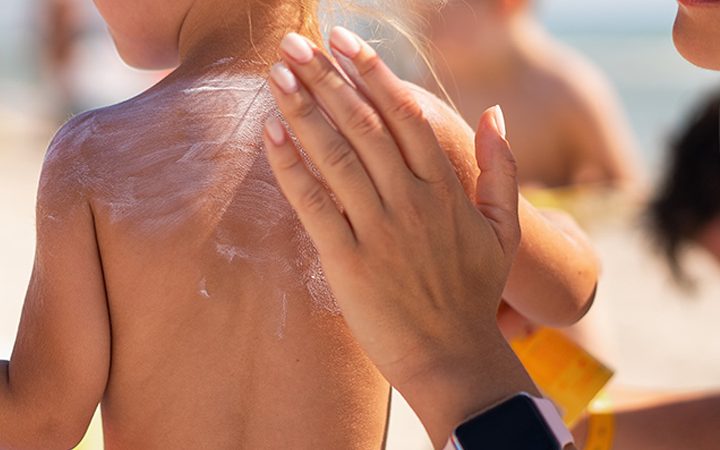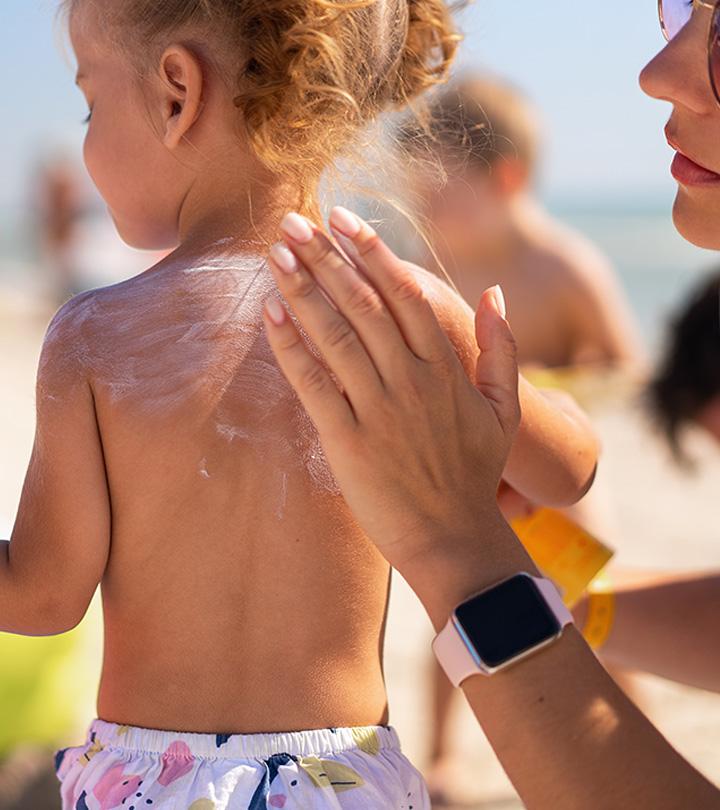Sunscreen or sunblock protects the skin from UV rays exposure. It helps reduce the risk of sun rashes, skin cancer, and sunburns. As babies have highly sensitive and delicate skin, they must be protected from the sun as recommended by the pediatrician.
The easiest way to protect babies from sun allergies is by avoiding exposure to direct sunlight. However, babies require fresh air. Thus, the right sun protection is essential. Read this post to learn about when to use sunscreen on babies and how to choose the right product.
Is Sunscreen Safe For Babies?
Infants have sensitive skin prone to sunburns. However, applying sunscreen on babies younger than six months can be harmful since they are prone to side effects such as rashes. Instead, you can use a stroller canopy outdoors to keep them away from direct sunlight (1).
When Can Babies Wear Sunscreen?
Babies above six months of age can wear sunscreen after consulting a pediatrician. Ideally, they should not be exposed to direct sunlight. However, if your baby is exposed to sunlight often, consult a doctor and choose a mild sunscreen. For infants younger than six months, avoid the sun and apply a minimal amount of sunscreen only after checking with your pediatrician (1).
How Much Sunscreen Should A Baby Wear?
Apply a thin layer of sunscreen with sun protection factor (SPF) 30 or higher on your baby to help prevent skin irritation. However, first, do a patch test on your baby’s wrist to check for signs of irritation (2). Apply the sunscreen 30 minutes before going outdoors and reapply it every two hours for maximum protection. If your baby is near a water body or swimming outdoors, ensure that the sunscreen is waterproof (3) (4).
How Do You Choose The Right Sunscreen For Babies?
The following tips can help you pick the right sunscreen for your baby (4):
- Choose a sunscreen with at least 30 SPF.
- Choose a broad-spectrum sunscreen to protect from UVA and UVB rays.
- Use water-resistant sunscreen, especially if the child swims in an open environment.
- Avoid sunscreens that contain oxybenzone and PABA as they may cause allergies.
- Choose mineral-based sunscreens containing titanium dioxide or zinc dioxide for sensitive skin.
What Are Other Ways To Protect Babies From The Sun?
The following steps could help protect babies from the sun (1) (3):
- Keep away from excessive sunlight. Avoid direct exposure to sunlight, especially during the peak hours of the day. Use an umbrella or the stroller’s hood for shade.
- Dress the baby appropriately. Dress them in long-sleeved clothing that is lightweight but not sheer enough to see through. A wide hat and sunglasses can offer extra protection.
- Keep the baby hydrated: Ensure the baby drinks enough water or other fluids on sunny and dry days.
- Look for signs of irritation: If your baby begins to turn red, gets fussy, or starts crying, take them indoors as the sun may be irritating them.
Protection from the sun is important at all stages of life, but babies need it more due to their delicate skin. When sun exposure is unavoidable, you can apply a thin layer of sunscreen to toddlers above six months. Contact your pediatrician if your baby experiences any skin issues due to sun exposure.
References:
MomJunction’s articles are written after analyzing the research works of expert authors and institutions. Our references consist of resources established by authorities in their respective fields. You can learn more about the authenticity of the information we present in our editorial policy.
The following two tabs change content below.




































